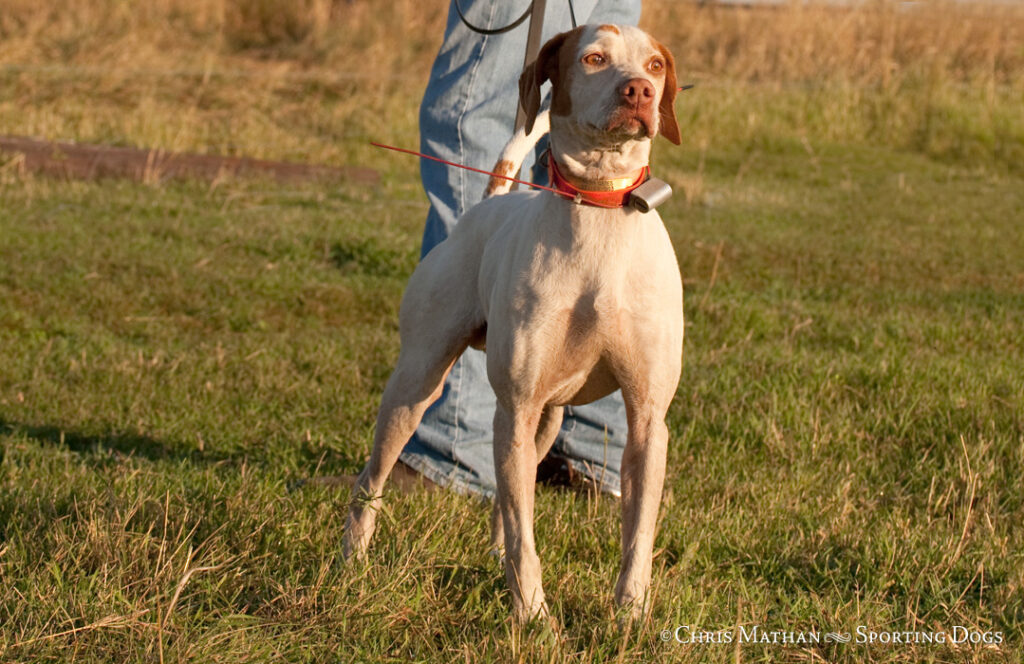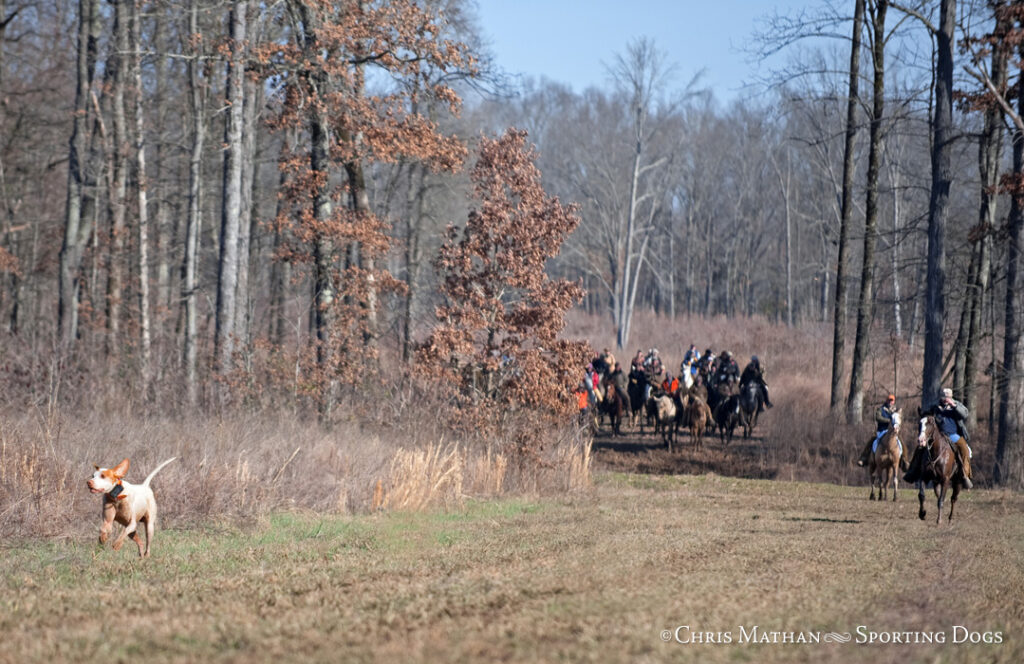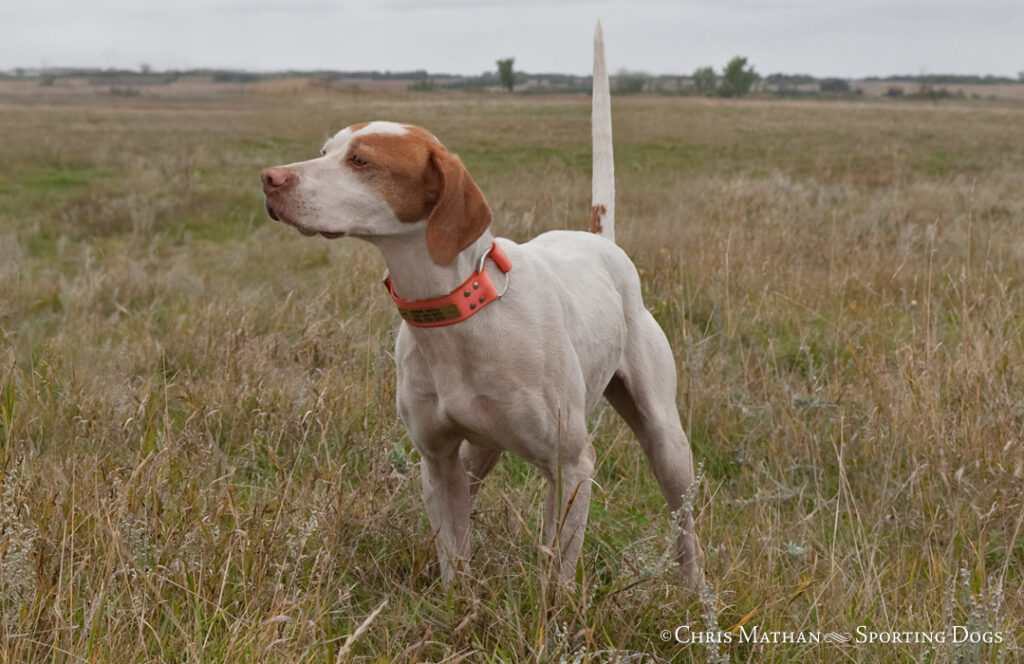Who was the luckiest pointing dog that ever lived?
His name was In the Shadow, call name “Buster,” and the story of his life holds many lessons and many joys.
The story began long before Buster’s birth. It began when a Kentucky race horse trainer named Carl Bowman was on a quail hunt in Oklahoma. There he heard from his guide, Chuck Taylor, of a marvelous young pointer bred and owned by Bob Shelton. Carl was asked if he might like to see Joe Shadow work, and said yes.
Thus began the string of good luck that would lead to the birth and life of Buster, a life that would bring happiness and glory for all connected with Buster, and to Buster himself.
Carl will tell you there is much he does not know about bird dog field trials, but that his life training race horses has taught him to appreciate animal athletic talent, including in bird dogs. And what he saw in Joe Shadow was that talent.
The dog seemed to glide over the Oklahoma prairie, constantly fast and forward. Then he’d be found pointing wild quail. It made a lasting impression.
Joe Shadow’s talent would be recognized by others, including John Rex Gates, who would pass the word to his brother Robin, who would acquire Joe Shadow for his all-age string and place him in the ownership of a long-time loyal patron, Butch Houston. Joe would enjoy a splendid field-trial career, including back-to-back wins of the Florida Championship.
Carl Bowman’s mentor in field trials was fellow Kentuckian Ferrel Miller, a status Carl shared with many another protege. In fact, Ferrel is the undisputed Wise Man of the pointing dog world. His dog Miller’s Silver Bullett is the all-time leading sire of the pointer breed, and Bullett’s son, Miller’s White Powder, was well on the way to topping his sire when a sea change in field trials came by edict from the Field Dog Stud Book (FDSB), the ruling authority.
The change required that DNA proof of parentage be provided for dogs to be recognized as field trial champion winners or placers. As a practical matter, this meant that all registration applications would soon have to be backed with DNA proof of parentage.
Then in 2004 came a drama involving Ferrel Miller and White Power. When a White Power pup, Miller’s On Line, won the National Bird Dog Championship, saliva evidence taken from On Line at the trial showed On Line’s maternal parentage had been misrepresented in his registration.
White Power was indeed On Line’s sire, as represented, but his dam was not as represented. The true dam was soon revealed and On Line’s registration corrected and his National Championship win confirmed, but the FDSB chose to impose capital punishment on Ferrel Miller for his alleged involvement in the misrepresentation. Ferrel was banned from registering dogs in the FDSB and from competing in field trials. The Amateur Field Trial Clubs of America (AFTCA), which sanctions amateur-handler trials, followed suit and banned Ferrel.
Pups sired by White Powder conceived after the banning would not be registered by the FDSB, no matter who owned White Powder. Thus the most valuable pointing dog in the world, White Powder, was rendered worthless.
Ferrel chose not to contest in court these actions by the FDSB and AFTCA.
What does this have to do with Buster? Buster was lucky to be sired by White Powder just before the cut-off date for registering White Powder pups.
Carl Bowman, a student of performance animal bloodlines, wanted to breed a pointer litter. In particular, he wanted to combine the blood of the dog he had watched in Oklahoma, Joe Shadow, with that of White Powder, Ferrel Miller’s dog he had long followed closely. (Carl had first watched a field trial when his mentor Ferrel Miller ran Silver Bullett in the National Bird Dog Championship.)
Carl called Robin Gates, who had handled Joe Shadow. Robin had female pups of Joe Shadow’s available. They were out of a daughter of Silverwood, a fact that struck a positive chord with Carl, who knew that Silverwood, a great talent himself, had produced females that produced talented dogs when bred to Joe Shadow, reminiscent of Secretariat, a notable strong breeding mare producer.
Carl bought three female Joe Shadow pups from Robin. He gave one to his Veterinarian, Dr. Hubert Doerr, with the understanding Carl could breed to her. She was named Doerr’s Clare’s Shadow and when bred to White Powder by Carl produced Buster, or In the Shadow, in a litter whelped March 17, 2004, St. Patrick’s Day and Carl’s birthday.
“I have always been lucky,” Carl says with a grin. Buster’s luck began with his human patrons, Carl and his wife Dianne, who took the litter and it’s dam at birth from the veterinary clinic to their home in Louisville to be cared for—attentively. From birth, the pups were handled and cuddled by Dianne hourly.
Soon the litter was being walked around the Bowmans’ large secure-fenced lawn, then on the nearby 1500 acre farm Carl managed. That farm was another factor in Buster’s good luck.
One pup in the litter stood out at the farm with its boldness and athleticism—Buster. By ten weeks he was finding and chasing paired-off quail across the large crop fields. He seemed tireless and always wanted more.
When Carl could not keep up with Buster on foot, he changed to an ATV. And soon after that Carl fitted a GPS tracking collar on Buster, so bold were his casts.
In his embrace of field trials, Carl had the good luck to meet Ben Adams, unofficial squire of Fort Campbell, a field trial Mecca in neighboring Tennessee. Carl took Buster there to show him to Ben when Buster was six months old.
“Hell, he could win any derby stake we run here,” Ben said after witnessing Buster’s first workout at Fort Campbell.
Dianne says Carl embraced field trials with the same enthusiasm as he had for horse racing. “He read, no, studied,— all the books recommended on training bird dogs. And on the farm with Buster he tried what the books recommended—except planted birds. Buster wanted nothing to do with pigeons and the farm held enough wild quail for Buster. So Buster was never trained on pigeons or put-out birds. Three to five days a week Buster and Carl were at the farm, early in the morning, for Buster to be run from the ATV.”
“I could whoa Buster at fifty yards when he was six months old,” Carl says proudly.
After Ben Adams saw Buster, Carl and Dianne decided Buster deserved a chance at a field trial career. At age eleven months they took Buster to compete in the John S. Gates Puppy Classic, where he was handled by Mike Martini and placed third. They saw Robin there and agreed to send Buster with him to Canada in July. Diane was fearful, afraid she would loose Buster to field trials. Buster was a house dog and her constant companion, with the run of the house and the Bowman’s large yard.
Carl met Robin with Buster in early July on Highway 24, two hours from Rend Lake where Robin had stayed overnight, and Buster was off on his first trip to Canada.
In a few days Robin called.
“Mizz Dianne, you got the real deal in Buster,” Robin said. Dianne cried.
When the prairie stakes came at the end of summer, Buster proved spectacular. He won the Saskatchewan Open Derby, John S. Gates Memorial Open Derby, Poverty Plains Field Trial Club Open Derby and Pelican Open Derby—a clean sweep of the Canadian prairie Derby stakes at less than two years of age. No one could recall a Derby winning all the Canadian Derby stakes.
The life of a major circuit field trial bird dog is grueling. Hour-after-hour in a cramped trailer compartment going trial to trial, followed by days on end on a tie-out chain at the trials. And the worst comes after the season ends in March. The dogs are confined idle in the trainer’s kennels until July when it’s time to travel north to prairie training grounds. Buster would never suffer this end-of-season confinement.
At the end of Buster’s Derby season in March, Carl and Dianne took Buster home to Louisville, where he resumed the life of a house dog and Dianne’s companion, alternating at his will between the fenced yard and the house, where he had his own bed and box of toys.
At first he seemed at a bit of a loss, but as soon as Dianne changed his collar from Robin’s orange plastic one to his leather one, he immediately readjusted to house-dog status and riding in Dianne’s Jaguar to the bank and Starbucks where drive-through tellers and baristas handed him treats through the car’s open roof.
Also while home, Buster resumed his runs on the farm where Carl took him early mornings three to five times a week. This kept Buster in top condition and ready to resume his life as a field trial dog when in early July Carl met Robin at a service station on Highway 24 for his second trip north to the Canadian prairies.
Robin had been fearful of Buster’s spending April through June at home with the Bowmans,—but he later realized it was best for Buster. And come July, Buster always greeted Robin joyfully on Highway 24, happy to resume life as a trial dog in his special compartment high in the front of Robin’s trailer where he was assured a breeze.
Buster’s next placement was second in the Pelican All-Age Classic in the fall of 2006, while still age two. Then in the fall of 2007 at age three he won the Blackbelt Open All-Age and in January 2008 the Florida Open All-Age Championship in a field of 86 to qualify for the National Championship and net Robin $20,000 of the $35,000 purse (Ted Baker had guaranteed it after selling his company, Florida Rock Industries, to Vulcan Materials and with his brother John buying Chinquapin Farm from the company).
In the spring of 2008 Buster, after a credible first run in the National Championship, placed Runner-Up in the Kentucky Open All-Age Championship before returning to Louisville and his role as a house dog for the rest of the spring. Buster was fit when Carl met Robin on Highway 24 in early July 2008 for the drive to Canada.
In October 2008 Buster returned to Chinquapin to place third in the Sunshine Open-All-Age.
Next he won the Southeastern Open All-Age Championship in the spring of 2009 after a second credible bid in the National Championship. Then he returned to Louisville and Dianne and Carl for his spring as a cherished house pet, but with free-running workouts on the farm at least three times a week.
In the fall of 2009 he placed again on the prairie with third in the Pelican Open All-Age.

In 2010, in his third bid in the National, he won it spectacularly with a 10-find race, finds evenly spaced and all at the front, and finishing as fresh as when released. He was not yet six years old. He had fulfilled the promise of his royal pedigree. Carl and Dianne had “caught lightning in a bottle” with their much-loved house dog.
In addition to his athleticism (speed, grace and style) Buster had demonstrated great intelligence, and National photographer Vera Courtney captured it in a photo. Getting far ahead of Robin on his twisty course, Buster had rimmed a large crop field and then laid down to wait and watch for Robin to come into view. When he saw Robin, he resumed his forward race. This was reminiscent of Jack Harper’s writings of the feats of The Texas Ranger.
Buster had shown other examples of great intelligence at home. Carl had a schedule of returning home after visiting his racing stables at Churchill Downs. Buster knew the schedule and would be waiting every day for Carl at the lawn gate when he returned. Jack Harper wrote of his setter Smoky Ginger barking as he approached driving to his kennels but while still out of Smoky’s sight and hearing.
Buster would also anticipate outings from home with Dianne or Carl, fetching them his leash when he sensed it was time to go. They believe he understood their conversations.
Just after winning the National Championship, Buster placed Runner-Up in the Southeastern Open All-Age Championship which he had won the year before. Then in the fall of 2010 he won the Sunshine Open All-Age which he repeated in October 2011, giving him four wins at Chinquapin, a record. He had also won the Pelican Open All-Age on the prairie that fall.

Carl, Dianne, Robin and Hunter had one more goal for Buster. He attained it in January 2012 by winning the Continental Open All-Age Championship convincingly with 3 finds qualifying and 6 in the finals.
Buster is the only dog to win the Florida, Continental and National Championships. He topped off a fabulous career at 19 placements with Runner-Up in the Alabama Open All-Age Championship in spring 2013, then was retired in perfect health and field trial condition to his life as the Bowmans’ constant companion in Louisville. He continued his frequent workouts on the farm until near his death.
“Buster was not just wide-running, he was obsessed with finding birds. He found birds on the farm in places we had no idea held birds. I had read that if a dog found too many birds it would not run enough, so I asked Robin about that. He said, ‘Don’t you worry about that.’ When I traveled to Leesburg for Buster’s workouts, I would only get to watch Buster for ten or fifteen minutes. Robin would pick him up after five finds,” Carl says.
I asked Carl, “Did Buster stay steady on point at flush after you retired him?”
“Absolutely,” Carl says proudly.
“We think it was the right thing to retire him when we did. Buster enjoyed his life at home, and we enjoyed him. Perhaps it contributed to his long healthy life. We are glad we did it,” Carl says.
Yes, Buster was the luckiest bird dog. And he filled the lives of his human partners with luck and joy.
Buster sired 51 winning offspring which to date have won 218 placements and among them are eight champions with thirteen titles, including Ch. Shadow’s Lord Magic, currently being campaigned by Dianne and Carl with Luke Eisenhart. They also have campaigned successfully Shadow’s White Cross who like his sire Buster won the Saskatchewan Open Derby and John S. Gates Derby Classic, and Shadows White Warrior, winner of the Dominion Championship, and the promising Shadow’s Lightning Strike.
Buster died November 2, 2021 from old age, in the presence of Dianne and Carl. For several years and until the end Buster slept curled up with his daughter Ravi, in his bed in the Bowmans’ Louisville home.
Eligible now for the Field Trial Hall of Fame, Buster is a most worthy candidate.

I saw Buster a lot in workouts after he returned from Canada his derby year. Also in trials as an AA. He was something special. I also bred a bitch to Buster that year. His first litter. I am still breeding his decedents and have some really nice dogs out of his granddaughter and Dominators Bull Market Bud. I’m looking forward to running them this year. Buster deserves to be in the HOF. He did things no other dog has done. One was winning all the major wild bird trials. He was retired in his prime at a very early age. No telling what his record would be if he had competed for 2 or 3 more years and been bred more.